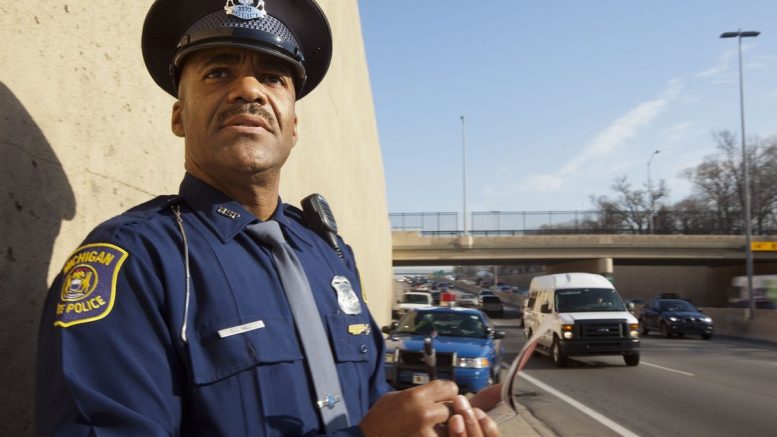Black troopers say they’ve faced retaliation after winning lawsuit against department struggling with diversity
Michigan State Trooper Darzeil Hall assists at the scene of an accident on the Southfield Freeway in Detroit n April 2013. (Photo: Kathleen Galligan, Detroit Free Press)Buy Photo
In 2013, two black Michigan State Police troopers won a high-profile lawsuit against their bosses for race discrimination.
Now the two are suing again — this time, claiming retaliation for filing a lawsuit in the first place.
Darzeil Hall and Lamarr Johnson, longtime troopers based in metro Detroit, say that ever since they won a $5.2-million jury verdict, Hall has been subjected to petty and personal attacks, a lowered score on a performance review and two baseless internal investigations. Johnson said he has been unfairly denied attempts at promotion.
“When you embarrass the department, when you take a stand for what’s right, they see it as heresy,” Hall said in a Free Press interview. “Instead of correcting the wrong … they’ll just go forth and take it out on the trooper that took a stand.”
The two filed their latest suit in January, and a court date has not been scheduled yet.
Their lawsuit comes as the department has struggled to make its ranks more diverse over the past two decades; its newest group of recruits is the most diverse in recent years.
Hall and Johnson are not the only troopers to claim unfair treatment. Since 2014, their Detroit-based attorney, Leonard Mungo, has filed eight lawsuits on behalf of State Police troopers in Wayne County Circuit Court, all of them pending. Most of these troopers say they were treated unfairly, and that race or gender was the motivating factor.
The department’s director, Col. Kriste Kibbey Etue, told the Free Press that she strongly rejects what she called “unconfirmed allegations” and said the Michigan State Police would never discriminate or retaliate against one of its own.
The most recent group of lawsuits filed by Mungo may not be unusually large: at least 52 troopers have sued the department since 1993 — an average of more than two lawsuits each year — with accusations ranging from racial discrimination to reverse discrimination, according to a list of lawsuits provided by the State Police.
“The only pattern that can be found amongst these lawsuits is a common attorney who has characterized his clients’ allegations as discrimination or retaliation,” she said.
‘Everything changed’
Hall says he didn’t suffer any major issues with racial discrimination through most of his 20-year career. But that began to change in December 2010, when he says that he and Johnson thought they had passed a training course for firearms examination. They were even given certificates at a public ceremony.
Two months later, they said, they were both removed from the program they thought they had passed, on accusations of poor performance. White participants who had lower scores were promoted, records have shown.
Hall and Johnson sued, and in December 2013, a jury thought they should be granted $5.2 million. None of the money has been paid because the Michigan State Police is appealing the verdict.
After the verdict, Hall and Johnson returned to work in metro Detroit. Hall said, “I pretty much knew that I would probably be a target, and unfortunately my worst fears came to pass.”
Within the first two years after the lawsuit, Hall said, supervisors began aggressively scrutinizing his behavior: an extremely minor error in his daily report sparked an internal affairs investigation; his take-home vehicle was taken away, while others in the detachment still had theirs; his key to a fitness center was deactivated, and for the first time in 20 years, he received a “needs improvement” rating in an annual evaluation.
“I’ve never gotten anything like that,” Hall said. “In year 20, I just forgot how to do my job?”
Johnson said in the lawsuit that he was denied at least five promotions since the lawsuit ended, although Mungo said he holds a master’s degree in public administration.
“For 15 years, I had a great career,” Hall said. “But after Trooper Johnson and I started to take a stand … everything changed.”
Hall and Johnson weren’t the only ones to claim fallout from the verdict in 2013.
Larry McSwain, who is black and testified in their case, said he also faced consequences. He was turned down for a job as a firearms evidence lab supervisor in August 2014, even though he was the lone applicant whose background made him eligible, said Mungo, who filed a lawsuit on McSwain’s behalf in June.
The supervisor position stayed unfilled, although 11 similar (and often less busy) positions around the state were staffed, Mungo said.
The State Police said in court records that the decision was driven in part by budgetary constraints.
 Buy Photo
Buy Photo
Attorney Leonard Mungo photographed in his office in Detroit on Monday, March 7, 2016. (Photo: Romain Blanquart, Detroit Free Press)
Attorney Leonard Mungo photographed in his office in Detroit on Monday, March 7, 2016. (Photo: Romain Blanquart, Detroit Free Press)
After Hall and Johnson’s first lawsuit, other troopers have come to Mungo with their own complaints.
One of those was Aaron Darkins, formerly the only black member of the police canine unit, according to Mungo. Darkins was demoted partly for leaving a Lions game at Ford Field in the fourth quarter when his bosses thought he should be supervising, Mungo said. He was also accused of putting in for too much overtime.
A performance evaluation found that his “time management skills are questionable” and that he is late to file critical paperwork. He denies the allegations. He was put back on road patrol and has since retired.
Mungo argues Darkins’ white counterparts have been treated with more leniency: In June 2013, a trooper left his two canines in a locked car with no ventilation for 10 hours, and they died, records show. Yet that trooper, who is white, was issued only a written reprimand, Mungo said.
After that incident, State Police noted in a statement from October 2015 that prosecutors cleared the trooper of any criminal wrongdoing, and that canine unit vehicles now have sensors in them so that the mistake is not repeated.
 Buy Photo
Buy Photo
Michigan State Police Director, Colonel Kriste Kibbey Etue, photographed on March 16, 2016. (Photo: Jessica J. Trevino, Detroit Free Press)
Michigan State Police Director, Colonel Kriste Kibbey Etue, photographed on March 16, 2016. (Photo: Jessica J. Trevino, Detroit Free Press)
‘We are on track’
Over the past few decades, the Michigan State Police has struggled to make its ranks reflect the population of the state.
While census figures show that Michigan’s population is about 14% African American, departmental figures from February show that there are 108 black enlisted members out of a force of 1,779 — or about 6%.
There used to be about twice as many black troopers more than 20 years ago, when the department emerged from a federal consent decree that mandated more hiring of women and minorities.
Hall said the lowered percentage of minority troopers “hampers the (agency’s) ability to go in and develop rapport with the community.”
But Etue, the department’s director, said those figures have started to rise dramatically. The newest group of 60 potential recruits is about 30% black and about 22% female. The department has held more than 400 recruitment fairs around the state since 2012, three quarters in urban areas, she said. Diverse hiring is one of her top priorities, and the department has three planned rounds of hiring in 2016.
“We’re starting to see the fruits of our labor,” Etue said. “That’s what I’ve been asking for a very long time.” She added: “I’m feeling like we are on track.”
Source: www.freep.com




